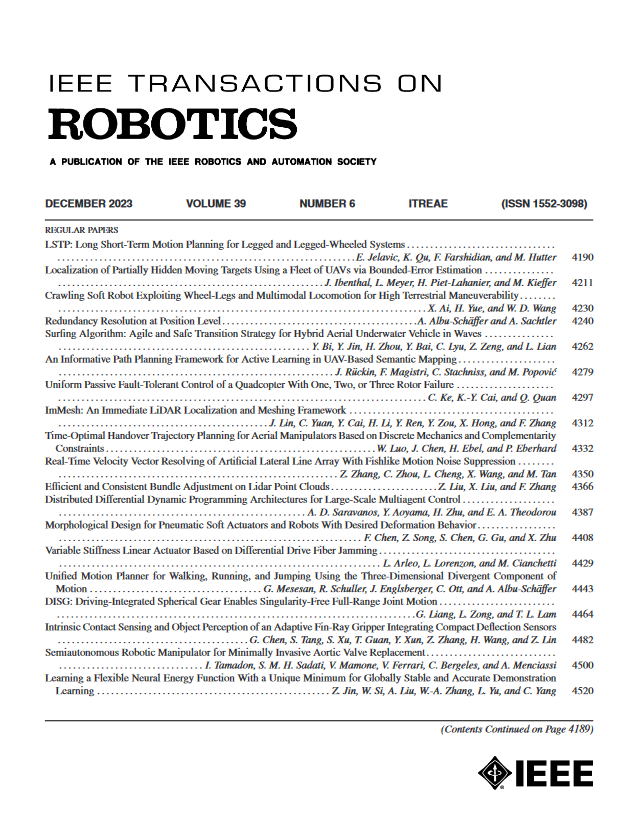RADIUM: Predicting and Repairing End-to-End Robot Failures Using Gradient-Accelerated Sampling
IF 9.4
1区 计算机科学
Q1 ROBOTICS
引用次数: 0
Abstract
Before deploying autonomous systems in safety-critical applications, we must be able to understand and verify the safety of these systems. For cases where the risk or cost of real-world testing is prohibitive, we propose a simulation-based framework for 1) predicting ways in which an autonomous system is likely to fail and 2) automatically adjusting the system's design and control policy to preemptively mitigate those failures. Existing tools for failure prediction struggle to search over high-dimensional environmental parameters, cannot efficiently handle end-to-end testing for systems with vision in the loop, and provide little guidance on how to mitigate failures once they are discovered. We approach this problem through the lens of approximate Bayesian inference, using differentiable simulation and rendering for efficient failure case prediction and repair (and providing a gradient-free version of our algorithm for cases where a differentiable simulator is not available). We include a theoretical and empirical evaluation of the tradeoffs between gradient-based and gradient-free methods, applying our approach to a range of robotics and control problems, including optimizing search patterns for robot swarms, UAV formation control, and robust network control. Compared to optimization-based falsification methods, our method predicts a more diverse, representative set of failure modes, and we find that our use of differentiable simulation yields solutions that have up to 10x lower cost and requires up to 2x fewer iterations to converge relative to gradient-free techniques. In hardware experiments, we find that repairing control policies using our method leads to a 5x robustness improvement.镭:使用梯度加速采样预测和修复端到端机器人故障
在安全关键应用中部署自主系统之前,我们必须能够了解和验证这些系统的安全性。对于现实世界测试的风险或成本令人望而生畏的情况,我们提出了一个基于模拟的框架,用于1)预测自主系统可能失败的方式,2)自动调整系统的设计和控制策略,以先发制人地减轻这些失败。现有的故障预测工具难以搜索高维环境参数,不能有效地处理具有视觉循环的系统的端到端测试,并且在发现故障后如何减轻故障提供很少的指导。我们通过近似贝叶斯推理的镜头来解决这个问题,使用可微模拟和渲染来有效地预测和修复故障情况(并为不可用的可微模拟器提供我们算法的无梯度版本)。我们对基于梯度和无梯度方法之间的权衡进行了理论和实证评估,并将我们的方法应用于一系列机器人和控制问题,包括优化机器人群的搜索模式、无人机编队控制和鲁棒网络控制。与基于优化的证伪方法相比,我们的方法预测了更多样化、更具代表性的失效模式集,并且我们发现,与无梯度技术相比,我们使用的可微模拟产生的解决方案成本降低了10倍,收敛迭代次数减少了2倍。在硬件实验中,我们发现使用我们的方法修复控制策略可以使鲁棒性提高5倍。
本文章由计算机程序翻译,如有差异,请以英文原文为准。
求助全文
约1分钟内获得全文
求助全文
来源期刊

IEEE Transactions on Robotics
工程技术-机器人学
CiteScore
14.90
自引率
5.10%
发文量
259
审稿时长
6.0 months
期刊介绍:
The IEEE Transactions on Robotics (T-RO) is dedicated to publishing fundamental papers covering all facets of robotics, drawing on interdisciplinary approaches from computer science, control systems, electrical engineering, mathematics, mechanical engineering, and beyond. From industrial applications to service and personal assistants, surgical operations to space, underwater, and remote exploration, robots and intelligent machines play pivotal roles across various domains, including entertainment, safety, search and rescue, military applications, agriculture, and intelligent vehicles.
Special emphasis is placed on intelligent machines and systems designed for unstructured environments, where a significant portion of the environment remains unknown and beyond direct sensing or control.
 求助内容:
求助内容: 应助结果提醒方式:
应助结果提醒方式:


